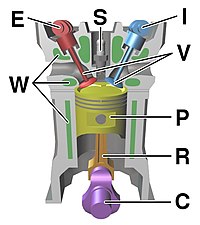
Photo from wikipedia
In manufacturing industry, the expenses for cutting fluids are about 7 to 17% of total production cost. The cutting fluids increase the health hazards as well as can cause a… Click to show full abstract
In manufacturing industry, the expenses for cutting fluids are about 7 to 17% of total production cost. The cutting fluids increase the health hazards as well as can cause a lot of environmental problems. In order to eliminate the ill effects associated with cutting fluids, it is now becoming necessary to move towards more sustainable techniques. To improve the surface quality of product and to minimize the expenditure of energy and resources it is essential to do optimization of turning parameters under sustainable cooling technique. For that purpose, grey relational analysis (GRA) proves to be a superior optimization technique to forecast and decision-making in various areas of manufacturing sector. In this research work, minimum quantity lubrication (MQL) setup has been developed and utilized for the experimentation. The nanofluids were prepared by adding the silicon carbide (SiC) nanoparticles (NPs) to the soluble oil with different weight percentages (0.5 wt.%, 1 wt.%, 1.5 wt.%). The thermal and tribological properties of SiC nanofluids were analyzed. Comparative analysis of MQL and SiC nanofluids based MQL turning has been done. Experimental results revealed that, the turning performance under SiC based nanofluids MQL mode is better as compared to MQL. The experimentation was planned as per Taguchi methodology. GRA has been employed to optimize the process parameters during turning of EN-24 steel under SiC based nanofluids MQL environment for better machining performance characteristics. The turning parameters under SiC based nanofluids MQL environment were optimized by GRA to obtain improved surface quality. The results revealed that optimization through GRA enhance output quality characteristics.
Journal Title: Silicon
Year Published: 2019
Link to full text (if available)
Share on Social Media: Sign Up to like & get
recommendations!